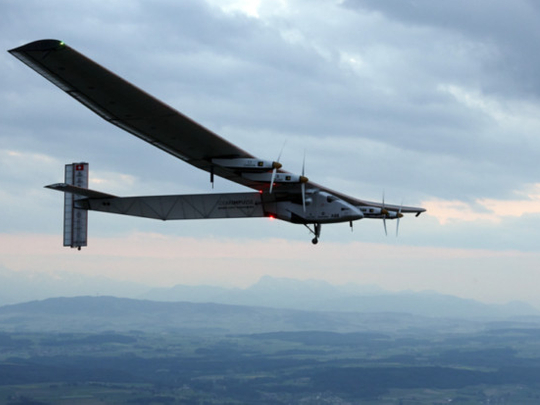
Payerne, Switzerland: A sun-powered plane made a successful test flight on Monday, clearing a vital hurdle towards its goal of a round-the-world trip next year, its pilot and mission chiefs said.
Solar Impulse 2 carried out a flight lasting two hours and 15 minutes, half an hour longer than scheduled, German test pilot Markus Scherdel said.
“Everything worked as expected,” Scherdel told a press conference at an air base in Payerne, central Switzerland.
“Of course, we have to do more testing, but it’s a good start and I’m looking forward to flying the airplane the next time.”
Built from carbon fibre, the 2.3-tonne plane has four 17.5-horsepower electrical motors powered by 17,248 solar cells studding its fuselage and 72-metre wingspan — as long as that of an Airbus A380.
It is the successor of Solar Impulse, a record-breaking craft that in 2010 notched up a 26-hour flight, proving its ability to store enough power in lithium batteries during the day to keep flying at night.
The forerunner was put through its paces in Europe, crossed the Mediterranean to reach Morocco and traversed the United States last year without using a drop of fossil fuel.
The goal with Solar Impulse 2 is to fly non-stop for more than 120 hours — five days and five nights — enabling it to cross the Pacific and Atlantic legs of its global mission.
The operation in March 2015 will circle the globe eastwards, making numerous stops on the way.
It will start in the Gulf, to benefit from the Middle East’s low-cloud conditions.
The plane will head over the Arabian Sea to India, Myanmar and China, then cross the Pacific Ocean, the United States, the Atlantic, southern Europe and finally North Africa before returning to its point of departure.
Speed at night will be limited to 46 kilometres per hour to prevent the batteries from being run down too quickly.
The pilot sits on a “business class” seat where he can take short naps, although lavatory conditions are described as basic.
He will be helped by a virtual co-pilot that will wake him up and report back any problems to mission control in Switzerland.
The masterminds of the project are Bertrand Piccard, the scion of a dynasty of Swiss scientists-cum-adventurers, and Andre Borschberg, a former Swiss airforce pilot.
Piccard made history in 1999 by becoming the first person to fly around the world in a hot-air balloon.
He and Borschberg founded Solar Impulse a dozen years ago, frustrated with traditional airplane makers who refused to take them seriously.
The pair argued that more efficient solar cells and batteries, coupled with ultra-light materials, could make a sun-powered plane a reality, even at night.
“This is really an experimental project of exploration, so everything is new,” Piccard said on Monday.
“We have to jump into the unknown at every moment, and today was one of these moments, where the first plane that should fly around the world next year had to be tested, fully tested, and I think for Andre and myself it was an incredible emotion.”
Borschberg said the test flight was “a very important step.”
“Our goal is to fly around the world next year, and we needed an airplane able to travel the first step, a flying laboratory.
“This airplane will travel many days and many nights over the ocean, so it’s a big step up from the first one.”












